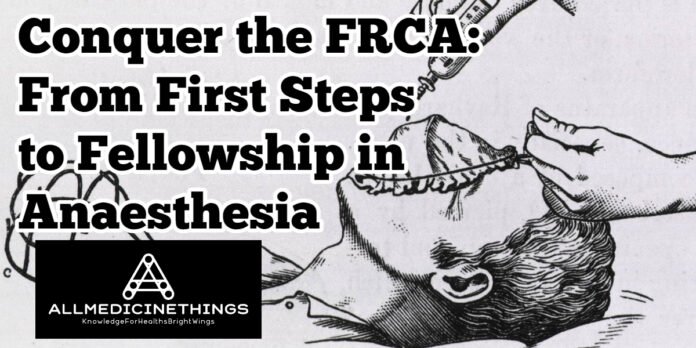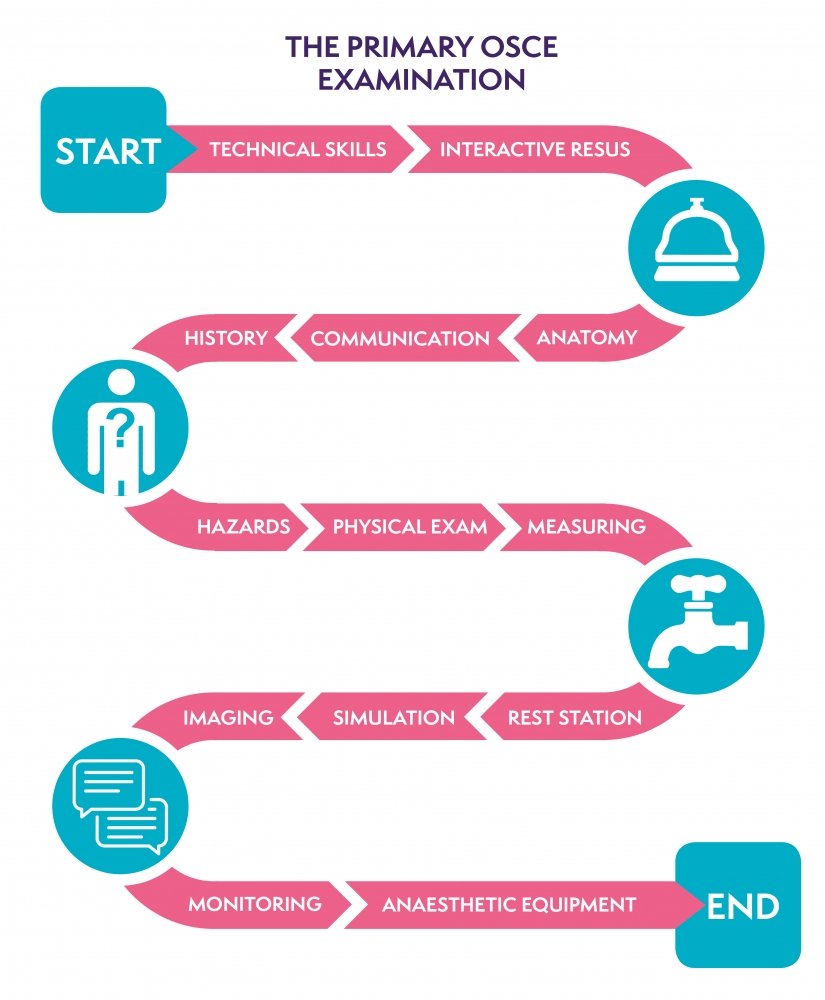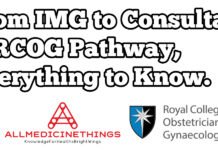Brief Explanation of What FRCA Is
The Fellowship of the Royal College of Anaesthetists, commonly known as FRCA, is a professional qualification for anaesthetists in the United Kingdom. Administered by the Royal College of Anaesthetists, this qualification is a hallmark of excellence in the field of anaesthesia, critical care, and pain management. Achieving this fellowship signifies a high level of expertise and competence, allowing the fellow to practice as a consultant anaesthetist. We have prepared your ultimate FRCA guide so buckle up.
Importance of FRCA for Anesthetists in the UK and Internationally
In the United Kingdom, FRCA is considered the gold standard for those pursuing a career in anaesthesia. It serves as an essential qualification for career progression, from being a trainee to becoming a consultant anaesthetist. While it is a UK-based qualification, the FRCA is held in high regard internationally. In some countries, it is considered an acceptable, if not equivalent, qualification to local board certifications. Therefore, FRCA opens doors not only within the NHS and private healthcare sectors in the UK but also in healthcare systems worldwide.
Objectives and Competencies Covered by FRCA
The FRCA curriculum is designed to ensure that anaesthetists are well-equipped with the necessary knowledge, skills, and attitudes to practice anaesthesia, critical care, and pain management at a consultant level. The fellowship assesses various competencies across different stages of training:
- Basic Level (CT1-CT2): Focuses on acquiring fundamental knowledge and skills in anaesthesia, including pre-operative assessment, basic life support, and common anaesthetic procedures.
- Intermediate Level (ST3-ST4): Builds on basic skills while incorporating more complex procedures and pharmacology, including managing patients with comorbidities and understanding advanced life support.
- Higher Level (ST5-ST7): Emphasizes specialized knowledge and skills, including regional anaesthesia, advanced critical care, and pain management.
- Advanced Training: Offers optional modules for sub-specialization, such as paediatric anaesthesia, obstetric anaesthesia, and cardiac anaesthesia.
Scope and Application of the Fellowship
The scope of FRCA extends beyond the operating room. It covers various facets of medical care, such as critical care medicine, chronic and acute pain management, and resuscitation services. Furthermore, the fellowship prepares anaesthetists for roles in administration, research, and teaching, thus paving the way for a well-rounded career.
In-Depth Look at Eligibility Criteria for FRCA: A Guide for UK and EU Residents
The path to becoming a fully-qualified anaesthetist in the UK involves not just rigorous training and examinations but also a series of eligibility checkpoints that serve as the foundation for your career. For the enthusiastic medical graduate brimming with potential, these criteria serve as your roadmap to the hallowed Fellowship of the Royal College of Anaesthetists (FRCA). Let’s dive deep into the prerequisites for this awe-inspiring journey.
Graduation from Medical School: The Starting Line
First thing’s first: the venerable medical degree, the parchment that declares your readiness to enter the medical battleground. Earning this degree from a recognized institution is your golden ticket into the world of anaesthesia. Those countless hours dissecting cadavers, memorizing biochemical pathways, and engaging in clinical rounds have all led to this moment—when you’re declared eligible to take the next step.
The Inside Scoop:
While most medical schools offer a generalized curriculum, some schools provide an early taste of anaesthesia through electives or rotations. Seize these opportunities if anaesthesia is the field you wish to conquer. It’s like getting a backstage pass to a rock concert—it offers an unparalleled view of the specialty you are so keen on mastering.
Full GMC (General Medical Council) Registration: The Official Seal
Once you’ve got that medical degree in your pocket, it’s time for the next crucial step—securing full registration with the General Medical Council (GMC). Imagine this as your “Medical License 2.0.” You’ve moved past the rookie stages of Foundation Year 1 (F1), and now you’re entering the big league. Full GMC registration signifies that you’re not just medically qualified but also adhere to ethical standards and professional responsibilities. It’s akin to being handed the keys to a shiny new car but with a manual that insists you know how to drive responsibly.
The Inside Scoop:
Before full GMC registration, you’ll initially be granted provisional registration during your Foundation Year 1 (F1). This is the period to showcase your competencies, impress your seniors, and most importantly, care for your patients with diligence and empathy. Excel in this year, and the road to full registration will be a smooth transition.
Initial Assessment and Interview: The Crucible
You’ve conquered medical school, navigated the intricacies of GMC registration, and now stand before the gateway to specialization—Core Anaesthetic Training (CAT). However, getting there is not a mere formality. You’ll undergo an initial assessment and interview designed to scrutinize more than just your academic acumen. Imagine this as the X-factor audition for medical professionals, a place where your medical portfolio, your knack for problem-solving, and your passion for anaesthesia are all laid bare.
The Inside Scoop:
Prepare, prepare, prepare! Dig into your academic records, case studies, and any instances where you displayed leadership or unique problem-solving skills. The interviewers aren’t just looking for book-smarts; they’re searching for individuals who display the multi-dimensional skills required to excel in this intensive field. Think of it as a MasterChef competition where your recipes include a dash of medical knowledge, a sprinkle of ethical considerations, and a heaping spoonful of interpersonal skills.
Navigating the FRCA Journey for International Medical Graduates: PLAB, Sponsorships, and Visas, Oh My!
So you’ve heard the call of the FRCA from lands far and wide, and you’re ready to join the ranks of elite anaesthetists in the United Kingdom. Excellent! The UK is not just the land of Shakespeare, the Beatles, and fish and chips; it’s also a mecca for medical excellence, particularly in the specialized field of anaesthesia. But before you pack your bags and hop on a plane, you’ve got some work to do. Let’s delve into what it takes for international medical graduates (IMGs) to embark on this prestigious pathway.
Overview of PLAB or Accepted Alternatives: The Golden Key
The Professional and Linguistic Assessments Board (PLAB) test is like your golden ticket to Willy Wonka’s chocolate factory, only replace the chocolate with an array of medical opportunities in the UK. This test ensures that you’ve got the goods—medically speaking—to match up with UK-trained doctors. PLAB is often considered the standard route for IMGs to prove their medical and English language capabilities.
The Inside Scoop:
- PLAB 1: A multiple-choice exam that tests your ability to apply medical knowledge for the care of patients.
- PLAB 2: An Objective Structured Clinical Examination (OSCE) that examines your clinical skills, including history-taking, examination, and problem-solving.
If PLAB sounds too daunting or if you have already undergone equivalent training, you’re in luck! There are alternatives:
- MRCP/MRCS: These are postgraduate medical diplomas that some choose as a PLAB alternative.
- An approved Postgraduate Qualification: A select few international qualifications are recognized by the GMC.
- Sponsorship under Medical Training Initiative (MTI): If you’re from a less-resourced healthcare system, this could be your way in.
Sponsorship and Visa Requirements: Your Red Carpet to the UK
Imagine standing at the edge of a cliff, the FRCA dream almost within reach, but there’s a gaping chasm between you and it. The visa process can often feel like that chasm. You’ll most likely need a Tier 2 (General) visa to enter the UK for your anaesthetic training. To obtain this, you’ll need a Certificate of Sponsorship (COS) from your UK employer—often an NHS Trust or health board.
The Inside Scoop:
- Certificate of Sponsorship (COS): It’s not just a document; it’s essentially your UK employer vouching for you. It’s as if they’re rolling out the red carpet, but you’ll need to prove you’re worth the welcome.
- IELTS/OET: Your English language proficiency will also be scrutinized. It’s not enough to be a medical maestro; you must be a linguistic one as well.
Maintenance Funds: You’ll need to show proof of sufficient funds to support yourself in the UK. Think of it as your financial “seatbelt” for this exciting ride.
Demystifying the FRCA Curriculum Structure: From Basics to Brains to Bona Fide Expertise
Understanding the curriculum structure for FRCA is like trying to read the blueprint for a multi-level, intricate, architectural wonder. It’s not just about going from Point A to Point B; it’s about a transformative journey that shapes you into a qualified and competent anaesthetist. This is your tour guide through the maze of Basic Level Training, exams, and procedures that lay the foundation for your FRCA journey.
Basic Level Training (CT1-CT2): The Boot Camp
Core Training in anaesthesia (CT1-CT2) is akin to a rigorous boot camp where you learn the essentials. The aim is to get you “match fit” for the complex world of anaesthesia. You’ll train under supervision, acquire foundational knowledge, and get hands-on experience in peri-operative care.
Rotations: Your Mini-adventures
Rotations during CT1-CT2 are like a series of mini-adventures that expose you to various sub-specialties within anaesthesia, like paediatric, obstetric, and critical care. Imagine this as an “anaesthesia buffet,” letting you sample different areas so you can make an informed choice for your future specialty.
Exams: The Academic Gauntlet
FRCA exams are not mere tests; they’re milestones that punctuate your academic journey. And yes, there’s more than one.
Primary FRCA: The Gatekeeper
The Primary FRCA is the first big exam you’ll encounter. Think of it as the “sorting hat” in the world of anaesthesia. It’s a comprehensive assessment that tests your understanding of the basic sciences underpinning anaesthesia.
Multiple Choice Questions (MCQ): The Brain-Teasers
These questions assess your knowledge in physiology, pharmacology, physics, and clinical measurement. It’s like a trivia game, but with life-changing implications.
Objective Structured Clinical Examinations (OSCE): The Performance Act
In OSCE, you’ll perform a variety of clinical tasks in a controlled environment. It’s like your acting debut, but your performance can have real-world implications for patient care.
Structured Oral Examinations (SOE): The Grilling Session
SOEs assess your depth of understanding and clinical reasoning. These are intense, face-to-face sessions where you articulate your understanding of complex scenarios. It’s like a Master’s viva but with medical scenarios as the discussion topic.
Required Procedures and Case Numbers: The Checklist
Alongside exams and rotations, you also need to meet certain procedural requirements. These aren’t just checkboxes; they’re rites of passage. For example, you’ll need to demonstrate proficiency in:
- Basic airway management
- Administration of general and regional anaesthesia
- Acute and chronic pain management
The Inside Scoop:
Documenting these procedures meticulously is crucial. Imagine these logs as your professional “scrapbook,” offering concrete evidence of your growing capabilities.
Navigating Intermediate Level Training for FRCA: A Decathlon of Medical Mastery
If Basic Level Training for FRCA was the boot camp that got you match-fit, then Intermediate Level Training (ST3-ST4) is the decathlon where your medical mastery is truly put to the test. Let’s call it your medical Olympics—packed with specialized rotations, challenging exams, and crucial life-support courses that make you the all-rounded anaesthetist you’ve always dreamed of becoming.
Intermediate Level Training (ST3-ST4): The Crucible of Expertise
Picture this stage as a crucible where raw talent is refined into professional expertise. ST3-ST4 presents you with more complex medical scenarios, a higher level of responsibility, and a broader scope of practice. You’re no longer the padawan; you’re evolving into a Jedi Master—of anaesthesia, that is.
Rotations: Your Anaesthetic Odyssey
Intermediate Level Rotations are akin to voyages through the complex archipelago of anaesthesia specializations. From cardiothoracic to neuroanaesthesia, your rotations allow you to dive deeper into niche areas. Think of each rotation as a specialized training camp where you pick up unique skills and strategies.
Exams: The Everest of Medical Assessments
Just when you thought you’d had your share of grueling exams, along comes the Final FRCA to up the ante. These aren’t just exams; these are the Olympian events of your medical decathlon.
Final FRCA: The Showdown
The Final FRCA is your showdown with medical academia, the final fortress to conquer in your journey towards Fellowship. It’s designed to assess your understanding, application, and analysis of the specialized knowledge relevant to anaesthesia.
Written Papers: The Scholar’s Challenge
These are not your run-of-the-mill multiple-choice papers. They are rigorously structured written assessments, designed to explore the depths of your medical understanding. Picture yourself as a detective piecing together medical facts and evidence-based practices.
Structured Oral Examinations (SOEs): The Expert’s Colloquium
If the Primary FRCA SOEs were grilling sessions, then the Final FRCA SOEs are a full-on MasterChef finale. This is where you display your finest culinary—ahem, clinical—skills. You’ll be critiqued by the best in the field, so bring your A-game.
Additional Courses: The Life-Savers
The Additional Courses are not just fancy add-ons to your CV; they’re essential life-saving tools in your anaesthetic toolkit. Let’s delve into a couple:
Advanced Life Support (ALS): Your Superpower
In Advanced Life Support, you learn to manage cardiac arrests and other life-threatening medical emergencies. Think of it as acquiring a superpower that can quite literally save lives.
Pediatric Life Support: The Guardian Angel
Managing children in emergencies requires special skills and care. This course transforms you into a guardian angel for the most vulnerable patients.
Elevating Your Game in Higher Level Training for FRCA: The Final Frontier and Beyond
If you thought the journey to becoming an elite anaesthetist plateaued at Higher Level Training, think again. ST5-ST7 is not just the final frontier; it’s a launching pad for greater vistas. This advanced stage of your training provides specialized rotations, research opportunities, and leadership experiences—yes, we’ve covered those. But there’s more. Your quest for anaesthetic excellence may lead you into optional realms of Advanced Training, where specialized fellowships, in-depth research, and leadership roles await.
Advanced Training: The Optional but Rewarding Odyssey
Think of Advanced Training as the optional DLC (Downloadable Content) in a video game. You’ve already had an epic journey, but here’s an opportunity to add even more layers to your expertise. Whether it’s specialized fellowships, groundbreaking research, or administrative mastery, this is your chance to specialize in the specialization!
Fellowships in Specialized Areas: The Elite Guilds
In the world of anaesthesia, Fellowships are like elite guilds where masters of the craft further hone their abilities. Whether it’s cardiothoracic anaesthesia, obstetric anaesthesia, or pain management, these Fellowships are the finishing schools where anaesthetists become the créme de la créme of their chosen fields.
Research Fellowships: The Scholar’s Mecca
Research Fellowships offer a deep dive into academic anaesthesia. You don’t just contribute to existing knowledge; you could potentially revolutionize practices and protocols. If you have a burning question or an innovative idea, this is your sanctuary to seek answers and bring those ideas to life.
Leadership and Administrative Roles: The Thrones of Influence
Taking on a leadership or administrative role is like ascending a throne of influence. It’s not just about overseeing operations; it’s about shaping policies, fostering team dynamics, and steering the course of healthcare delivery in your area.
Advanced Procedures and Skills: The Magnum Opus
Yes, you already encounter advanced procedures in ST5-ST7, but Advanced Training takes it up a notch. Imagine performing ultra-complex operations with the finesse of a maestro, mastering cutting-edge technologies, or even contributing to the development of new techniques.
The Inside Scoop:
The depth of mastery achieved here is akin to a musician composing a magnum opus or an artist painting a masterpiece. It’s an in-depth expertise that goes beyond textbooks, radiating from your every decision, every action.
The Comprehensive Overview: What You’re Signing Up For
- Specialized Rotations: A journey through the elite avenues of anaesthesia.
- Research Opportunities: A ticket to groundbreaking studies and academic contributions.
- Leadership Training: A course in managing teams, operations, and even yourself.
- Advanced Procedures: A hands-on experience with the pinnacle of medical techniques.
- Advanced Training: The optional yet fulfilling layers that make you a titan in your field.
Navigating the Examination Maze: In-Depth Look at Primary FRCA
Components: The Triad of Challenges
The Primary FRCA is a trifecta of tests designed to probe different facets of your knowledge, skills, and reasoning ability. Here are the key components:
Multiple Choice Questions (MCQ)
- Purpose: To assess your foundational knowledge in areas like pharmacology, physiology, and clinical anatomy.
- Format: Typically, you’ll be tackling around 90 questions in a two-hour window.
Objective Structured Clinical Examinations (OSCE)
- Purpose: To evaluate your ability to perform clinical tasks and make decisions in simulated settings.
- Format: 16-18 stations where you demonstrate skills ranging from patient assessment to equipment setup.
Structured Oral Examinations (SOE)
- Purpose: To gauge your clinical reasoning and problem-solving skills in a high-stakes, face-to-face encounter with examiners.
- Format: Consists of two separate SOEs, each lasting around 30 minutes, covering topics such as pre-operative assessment and intra-operative management.
Recommended Study Resources
Navigating the rigors of Primary FRCA exams without the right study material is like sailing uncharted waters without a compass. Here are some must-have resources:
- Textbooks: Works like “Baby Miller” (Basics of Anesthesia by Miller & Pardo) and “Stoelting’s Anesthesia and Co-Existing Disease” are considered essential reading.
- Online Databases: Resources like Medscape and UpToDate can offer up-to-date clinical guidelines and reviews.
- Flashcards: Applications like Anki offer specialized FRCA decks that you can use for quick revisions.
- Practice Papers: Many organizations offer mock exams and past papers that can serve as excellent practice material.
Sample Questions and Answers
- MCQ Sample: Which of the following is a common side effect of Propofol?
A) Tachycardia
B) Hypotension
C) Hyperglycemia
Answer: B) Hypotension - OSCE Sample Task: Demonstrate how you would prepare and administer a spinal anaesthetic.
Answer: Start with hand hygiene, don PPE, perform an aseptic technique, identify the correct patient and surgical site, etc. - SOE Sample Question: How would you manage a patient showing signs of malignant hyperthermia during surgery?
Answer: Immediate discontinuation of triggering agents, administration of intravenous dantrolene, aggressive cooling measures, and supportive therapies.
Exam Centers and Fees
- Exam Centers: FRCA exams are conducted at several centers across the UK, and sometimes overseas. You can find the full list on the RCoA (Royal College of Anaesthetists) website.
- Fees: The examination fees can vary depending on multiple factors including your membership status with the RCoA and the specific exam component. Always check the RCoA’s official website for the most up-to-date information.
Conquering the Summit: Unpacking the Final FRCA
Components: The Final Battlegrounds
The Final FRCA Examination is the grand finale of your training, the last mile in your marathon. Here’s a breakdown of the key components:
Written Papers
- Purpose: To assess your in-depth understanding of specialized areas within anaesthesia, critical care, and pain management.
- Format: The written examination usually includes two papers, often in a single best answer (SBA) format, each lasting 3 hours.
Structured Oral Examinations (SOEs)
- Purpose: An extension of the Primary FRCA’s SOEs, the Final FRCA SOEs go further, delving into nuanced clinical scenarios and challenging your diagnostic and management skills.
- Format: Similar to the Primary FRCA, the Final FRCA SOEs consist of two rounds of interviews, with each round lasting around 30 minutes.
Recommended Study Resources
The Final FRCA demands a more focused study approach, given its specialization and depth:
- Advanced Textbooks: Books like “Morgan & Mikhail’s Clinical Anesthesiology” and “Anaesthesia and Intensive Care A-Z” are must-haves.
- Online Journals: Subscriptions to journals like the British Journal of Anaesthesia can provide insights into cutting-edge research and developments.
- Mock Exams: By now, you’re probably aware of the immense value of practice. Mock exams, whether conducted within your department or accessed online, are invaluable.
- Webinars and Courses: These are increasingly popular methods for gaining insights from experts in the field.
Sample Questions and Answers
- Written Sample: What is the primary receptor targeted by opioids for analgesic effect?
A) NMDA receptor
B) Mu receptor
C) Alpha-2 receptor
Answer: B) Mu receptor - SOE Sample Question: What would be your anaesthetic plan for a patient with severe preeclampsia requiring a cesarean section?
Answer: The approach would involve thorough preoperative assessment, use of antihypertensive medications, planning for spinal anaesthesia with adequate precautions for potential complications, and postoperative ICU management.
Exam Centers and Fees
- Exam Centers: The list of exam centers for the Final FRCA doesn’t differ much from the Primary. You’ll likely have options across the UK, and sometimes overseas.
- Fees: As with the Primary FRCA, the fees can vary, so it’s best to consult the RCoA website for accurate, up-to-date information.
The Theaters of Excellence: Training Centers and Research in FRCA
Overview of Leading Training Centers in the UK
If the FRCA is an epic, then its training centers are the various stages where your skills get honed. Here are some of the illustrious ones:
- Imperial School of Anaesthesia: Based in London, this center is renowned for its comprehensive training programs and state-of-the-art facilities.
- Deanery of Wales: Known for its close-knit training community and excellent mentorship.
- North Western Deanery: Located in Manchester, this center offers one of the best simulation-based trainings in the country.
How to Apply
- Application Portal: Each center typically has an online application portal that opens during specific periods.
- Document Requirements: Expect to furnish transcripts, GMC registration proof, and letters of recommendation.
- Interviews: Be prepared for a round (or more) of interviews that not only probe your technical skills but also assess your fit with the institution’s ethos.
Reviews and Recommendations
- Alumni Feedback: Before you commit, it’s invaluable to get insights from past or current trainees. Online platforms like FRCA forums often feature reviews.
- Hospital Ratings: Websites and publications sometimes rate medical training facilities. Although not the ultimate decider, they do offer an additional perspective.
Research Opportunities: The Bedrock of Progress
Why Research is Important in Anaesthesia
Research in anaesthesia doesn’t just contribute to academic journals; it directly influences patient outcomes and sets new standards of care. It can lead to groundbreaking discoveries that revolutionize the field, from pain management strategies to innovations in equipment.
Journals and Conferences to Target
- Journals: British Journal of Anaesthesia, Anaesthesia, and Anesthesiology are just a few prestigious outlets where you can aim to publish your work.
- Conferences: Events like the Annual Congress of Anaesthesiology or the Euroanaesthesia Conference offer platforms for presenting your findings and networking with giants in the field.
Potential Research Topics and Areas
- Pharmacological Advances: Study the effects of new drugs or drug combinations in anaesthesia.
- Technological Innovations: Investigate how AI or machine learning could be used in anaesthetic procedures.
- Patient Safety: Research focused on minimizing errors and optimizing safety protocols can have wide-ranging impact.
-
-
Charting the Course Ahead: Career Prospects and Financial Considerations
Career Prospects: Within the UK
Academic vs. Clinical Roles
- Academic Roles: If the allure of research and education beckons, academic roles offer a blend of clinical practice and scholarly pursuits. Positions often include lecturing, mentorship, and active research.
- Clinical Roles: For those who thrive in the hustle and bustle of hospital corridors, clinical roles are abundant. Consultancies in anaesthesia or specialized roles in areas like cardiac anaesthesia or pediatric anaesthesia can be deeply rewarding.
NHS and Private Sector
- NHS: The National Health Service offers a structured career progression with a dependable salary scale, pension, and opportunities for further training.NHS Careers
- Private Sector: Greater autonomy and potentially higher earnings are attractive, but the challenges include managing your practice and less job security.
Locum Work
- Flexibility: Locum roles offer the chance to gain diverse experience and offer flexibility but might lack some of the longer-term benefits of permanent positions.
International Opportunities: Your Skills Beyond Borders
Countries Where FRCA is Recognized
- Australia and New Zealand: Mutual recognition agreements mean your FRCA is highly respected here.
- Canada and the U.S.: While the FRCA is recognized, you’ll usually need to pass additional exams to practice.
Additional Exams or Certifications Needed
- United States: You would need to clear the United States Medical Licensing Examination (USMLE) among others. We have another article on USMLE if you wanted to read is here Thinking to Consider USMLE in 2023? Look at this first.
- Canada: Licentiate of the Medical Council of Canada (LMCC) is required.
Financial Considerations: The Investment and the Returns
Estimated Costs of Exams
- Primary FRCA: Around £1,000 to £1,500 depending on several factors.
- Final FRCA: The costs can climb up to £2,000, depending on the centers and any resits.
Funding and Scholarships
- Royal College Scholarships: Keep an eye on scholarship opportunities provided by the Royal College of Anaesthetists.
- NHS Bursaries: Sometimes available based on specific criteria.
Salary Scales for Different Roles
Consultant Anaesthetist: The NHS salary for a consultant can range from around £82,000 to £110,000 per year depending on experience and location.
Academic Roles: Salaries can vary widely, from £50,000 upwards, depending on the institution and responsibilities.
Locum Work: Earnings vary greatly but can sometimes exceed NHS scales for comparable roles.
The Final Chapter: Conclusion and Your First Steps on the FRCA Pathway
Summary of the FRCA Pathway
The Fellowship of the Royal College of Anaesthetists (FRCA) is not just a series of examinations; it’s a comprehensive, structured training program that shapes well-rounded, competent, and empathetic anaesthetists. From the earliest phases at Basic Level Training to the peaks of Higher Level and Advanced Training, each stage serves a purpose: to prepare you for the intricacies of a demanding, but profoundly rewarding, medical specialty.
The journey offers a balanced diet of clinical rotations, assessments, written exams, oral exams, and optional fellowships in niche areas. Alongside, there’s a buffet of research opportunities that can pave the way for academic pursuits or evidence-based clinical excellence.
Steps to Start the Journey
- Eligibility Check: Ensure you meet the basic criteria, which differ for UK/EU residents and International Medical Graduates. Secure full GMC registration.
- Career Counseling: Engage with mentors or career counselors to understand what anaesthetics and the FRCA entail, and whether they align with your aspirations.
- Training Center Selection: Research and apply to the training center that fits your career goals and learning style.
- Financing: Look into the costs of exams, courses, and possible scholarships or funding options.
- Engage with the Curriculum: Once accepted, dive headfirst into the curriculum, which will be your roadmap for years to come.
- Exam Preparation: Start preparing for the Primary FRCA as soon as you can, using resources, study groups, and mock exams to your advantage.
- Continuous Learning and Assessment: Embrace the rotations, case reports, and continuous assessments as learning opportunities rather than hurdles.
- Specialize and Research: As you reach the Higher Level and possibly opt for Advanced Training, hone your interests in specialized areas and engage in research.
- Career Planning: Concurrently, start thinking about your post-FRCA career, be it clinical, academic, or international.
Embarking on the FRCA journey is like stepping onto a high-speed train bound for professional excellence. It’s an endeavor that demands rigor, resilience, and a relentless curiosity. However, the rewards are immeasurable—not just in terms of career advancement and earning potential, but in the capacity to make a tangible difference in people’s lives.
So, have you checked your eligibility? Picked out potential training centers? Thought about funding options? Good. Now take a deep breath, steel yourself, and take that first step. Your FRCA odyssey awaits, and it promises to be an incredible ride, also leave your questions in the comments section below.








